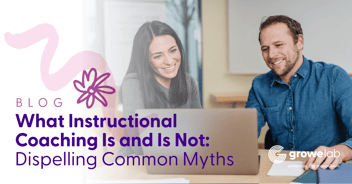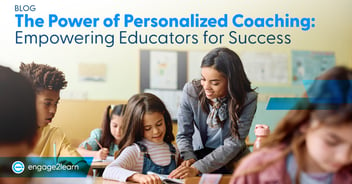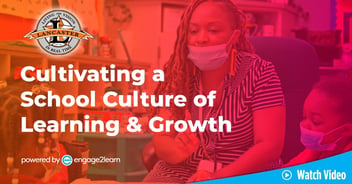The Science of Coaching: What is it and how do educators use it?
Job-embedded instructional coaching has emerged as one of the most effective strategies for improving teacher practice and, consequently, student outcomes.
Unlike traditional professional development that comes packaged in a one-size-fits-all model, collaborative instructional coaching creates a supportive partnership between instructional coaches and educators, either in a one-on-one or PLC setting. Because of this, educators are able to focus on their own growth aligned to role-specific competencies, school and/or district priorities, and the unique learning needs of a given school’s student population, rather than a remedial, judgemental, or strictly evaluative process.
We have seen first-hand the profound impact of these supportive coaching partnerships over the past 12+ years, heeding the wisdom of Dr. Atul Gawande: “Coaching done well may be the most effective intervention designed for human performance.” Grounded in trust, collaboration, and reflection, we’ve seen firsthand that teacher coaching “done well” enables educators to grow, explore their challenges, and take risks without fear of negative consequences.
Amidst this growing excitement around coaching teachers, however, many school and district leaders find themselves making large investments in coaching programs without first having a clear idea of the specific practices that are the most effective for supporting educators. With every coaching program comes the promise of improved teacher retention and student outcomes, but without the research to support these claims, ed leaders are made to make decisions based on instinct rather than data.
Enter, the science of coaching.
The Research Behind the Science of Coaching
Built upon 10 years of validated, peer-reviewed research from esteemed professors at Rutgers and Arizona State Universities on the most effective coaching strategies for public school educators, the science of coaching comprises 3 coaching skills and 6 essential coaching actions that are proven to consistently increase teacher retention and improve student outcomes.
In addition to conducting their own research, Dr. Linda Reddy from Rutgers University and her colleague Dr. Alexander Kurtz from Arizona State University synthesized decades of existing research on the best instructional coaching practices with the goal of providing a clear coaching framework that leads to meaningful outcomes for leaders, teachers, coaches, school support staff, and students.
For example, Dr. Reddy and Dr. Kurtz’s research includes studies on behavioral support coaching for paraprofessionals, coaching on positive reinforcement strategies in high-poverty school classrooms, and coaching on behavior management strategies in special education classrooms in high-poverty schools.
Across the board, the findings overwhelmingly support the impact of the 3 coaching skills and 6 essential coaching actions on educator effectiveness and student behavior, engagement, and achievement.
This research is significant, not only because it finally gives coaches and teachers a clear, structured, and proven system for growth, but also because it empowers school and district leaders to make data-informed decisions about the kind of instructional coaching they should be investing in.
In other words, with the science of coaching, the era of go-with-your-gut coaching is officially over. This transformative approach thrives on personalized support and measurable educator growth in role-specific competencies, ultimately fostering a sustainable culture of ongoing adult and student learning.
“The evidence-centered, action–outcome framework provides a systematic approach to measure and drive continuous improvement for coaching talent and schools.”
Assessing the Effectiveness and Interactions of Instructional Coaches
Linda A. Reddy, PhD; Todd Glover, PhD; Alexander Kurz, PhD; Stephen N. Elliott, PhD
FREE RESOURCE: Download the 3 Coaching Skills Infographic
The 3 Coaching Skills
Thanks to this research, effective coaching isn’t a mystery. It’s science!
Especially when paired with an all-in-one instructional coaching and talent development platform like GroweLab, the 3 coaching skills are proven to drive meaningful educator growth, increase teacher retention, and accelerate student outcomes. The 3 skills are as follows:
01: Collaborative Goal Setting
According to the latest research, ensuring positive and meaningful professional learning outcomes hinges on effective collaboration between each teacher and their coach. Here, coaches work individually with educators to help them identify their strengths, areas for improvement, growth goals on role-specific competencies and instructional best practices, and ways to measure and assess goal attainment along the way.
Watch the on-demand webinar on collaborative goal setting here!
02: Implementation Design & Support
The latest research also points to observational data as a critical tool for generating positive, constructive feedback and assessing the effectiveness of coaching efforts and classroom implementation. Here, coaches collaborate with teachers to develop an implementation plan, create goal-specific options and next steps, consider resources and potential barriers, share and model real examples, and create opportunities for feedback on evidence of on-the-job practice.
Watch the on-demand webinar on implementation design & support here!
03: Data-Informed Feedback
The research also shows that clear, frequent, and positive feedback improves coaching, teaching, and student outcomes. Additionally, the evidence reveals that many teachers consider instructional coaching paired with data-informed feedback to be a positive source of professional development, thereby removing potential barriers to ongoing professional learning and growth. Here, coaches regularly monitor and interpret educator growth data to provide educators with timely praise, offer constructive feedback, assess progress and skill acquisition, and measure the overall effectiveness of their own coaching efforts.
Watch the on-demand webinar on data-informed feedback here!
The Real-World Impact of the Science of Coaching
When the researchers began interpreting and publishing their findings, they discovered an existing instructional coaching model that aligned to the actions and skills that make up the science of coaching. Dr. Reddy put it this way:
“engage2learn (e2L) was the only coaching organization we found that was already aligned to our research. We know the experts at e2L will be able to scale the impact of our validated assessment data insights and provide measurable results for schools.”
Not only does the independent research prove the efficacy of e2L coaching, our extensive coaching experience has produced over a decade of evidence of on-the-ground, transformative impact that our partner districts experience every single day.
|
The Challenge: Increase teacher retention through personalized coaching across the Arlington Independent School District in Texas. The Results: In addition to helping three elementary schools graduate from a ‘D’ to a ‘B’ state rating in just one year, comprehensive coaching and talent development support from e2L has a statistically significant impact on job satisfaction and teacher retention, helping to retain 98% – 100% of coached teachers and save the district $9 million over five years (even during the pandemic!). |
|
|
The Challenge: Improve WIDA ACCESS scores for English language learners (ELLs) across the Providence Public School District in Rhode Island. The Results: Targeted teacher coaching from e2L has a statistically significant impact on WIDA ACCESS scores for ELL students. |
|
 |
The Challenge: Improve reading and math scores for K-5 graders across the Abilene Independent School District in Texas. The Results: Job-embedded coaching from e2L has a statistically significant impact on NWEA MAP Growth in reading and math for K-5 students, improving the state ratings for multiple district schools, including getting Bonham Elementary School from an ‘F’ to a ‘C’ rating in just one year! |
Tips for Integrating the Science of Coaching Into Your Coaching Methodology
No principal or superintendent wants to waste critical funding on an expensive, ineffective teacher coaching program. By integrating the science of coaching into your coaching framework, you can sleep well at night knowing that your investments in educator support are leading to measurable outcomes.
- Assess Current Coaching Practices
Collaborate with leaders, coaches, and teachers to evaluate your existing coaching practices, identify areas that align with the science of coaching, and adjust or strategically abandon those that do not. - Invest in Train-the-Trainer Coaching
Coaching isn’t just for teachers; coaching is for everyone! Provide job-embedded support for your coaching team, focusing on coaching competencies, skills, and actions within the science of coaching. - Utilize Advanced Data Analytics
Use a coaching documentation and data analytics platform like GroweLab to streamline data collection, conduct regular analyses, simplify reporting, and correlate educator growth to student outcomes data. - Promote Feedback and Reflection
Develop a culture of positive feedback and self-reflection to keep both coaches and teachers engaged in their ongoing growth. - Scale for Impact
As you start to see your teachers grow and students succeed, explore opportunities to scale up the science of coaching across your school or district. - Get Certified in the Science of Coaching
Participate in e2L’s Data-Informed Growth (DIG) Collaborative, a 12-week program designed to help coaches and school leaders become highly proficient at implementing the science of coaching.
Instructional coaching for teachers will continue to be a powerful strategy for enhancing teacher growth and student outcomes in K-12 schools. To harness its full potential, it's critical to incorporate the research-backed science of coaching into your coaching methodology. By doing so, you're setting your school or district on a path toward a culture of continuous improvement that benefits educators, students, and the community at large, ushering in a brighter future for public education.
RELATED: How Do You Know if Teachers Are Growing?
Ready to bring the science of coaching to your school or district? Click here to explore e2L partnership options.



